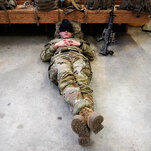During deployments in Iraq and Afghanistan, commanders often failed to prioritize sleep. Changing schedules, long duty shifts and overnight missions led to chronic fatigue that fueled a
“The Army has always had an internal dynamic that real men don’t need sleep and can just push on, and it’s incredibly stupid,” said Lt. Gen. David Barno, who was commander of combined forces in Afghanistan from 2003 to 2005. “Combat is a thinking man’s business and your brain doesn’t function without sleep.”
General Barno said he worked hard to “protect eight hours of sleep a night” while deployed and found that it gave him a clearheaded advantage to accomplish his mission. Putting that practice in official doctrine, he said, will help put old beliefs that sleep is a luxury to rest.
“The Army is on to something here,” said Phillip Carter, a former soldier who served during the Iraq War and now teaches veterans’ policy at Georgetown University. “The old manual looked like something out of a gym class from the 1960s. There was lots of jumping jacks and wind sprints. It wasn’t keeping pace about what we knew about combat. The truth is, we know sleep is critical to better decision-making.”
The military’s interest in holistic health began years ago in elite Special Operations units, which brought in trainers, dietitians and wellness coaches and treated operators like elite athletes.

The shift to a broad approach to fitness that includes sustainable exercise, better recovery and proper sleep and nutrition could have big payoffs in the wider military, Mr. Carter said, both in terms of lifelong well-being and in monetary savings for the taxpayer.
Worn-out knees, injured backs and other musculoskeletal injuries are the leading reasons that troops receive disability payments after leaving the military. “The government is spending billions of dollars a year to compensate troops for breaking them in service,” Mr. Carter said. “If it’s just a little bit better, it could be a huge difference.”





